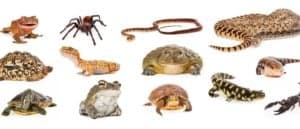It’s hard to deny that Texas is one of the most unique places in America. In fact, a few years ago, Business Insider ranked Texas in the top 20 weirdest states! There are many reasons for this, but one of the most interesting is the animals that are legal to own there. Sloths, lemurs, capybaras, and even tigers are all perfectly fine for Texans to keep as pets, as long as their owners can handle them! Let’s explore 11 exotic animals that are surprisingly legal to own in the state of Texas.

Exotic Animals in The State of Texas: A Brief Overview
It’s no secret that Texans love their animals. The bond a human can share with their pet is one of the most beautiful experiences anyone can have. For years, people may have been satisfied with keeping dogs, cats, and birds, but what happens when the thrill wears off? For some, seeking unique and difficult-to-find animals might be the next step in their journey. This is what leads to people becoming the proud owners of animals most would find crazy, such as primates or big cats.
Luckily, not everyone can just obtain an exotic animal. In fact, lawmakers in Texas have put regulations in place to control the sale and purchase of these animals. Depending on which animal you’re interested in owning, you may need to obtain a certificate of registration. Requirements that must be met before bringing an exotic animal home are strong fencing, enrichment items, an environment with an adequate amount of square feet, and proper resting areas.
1. Capybaras
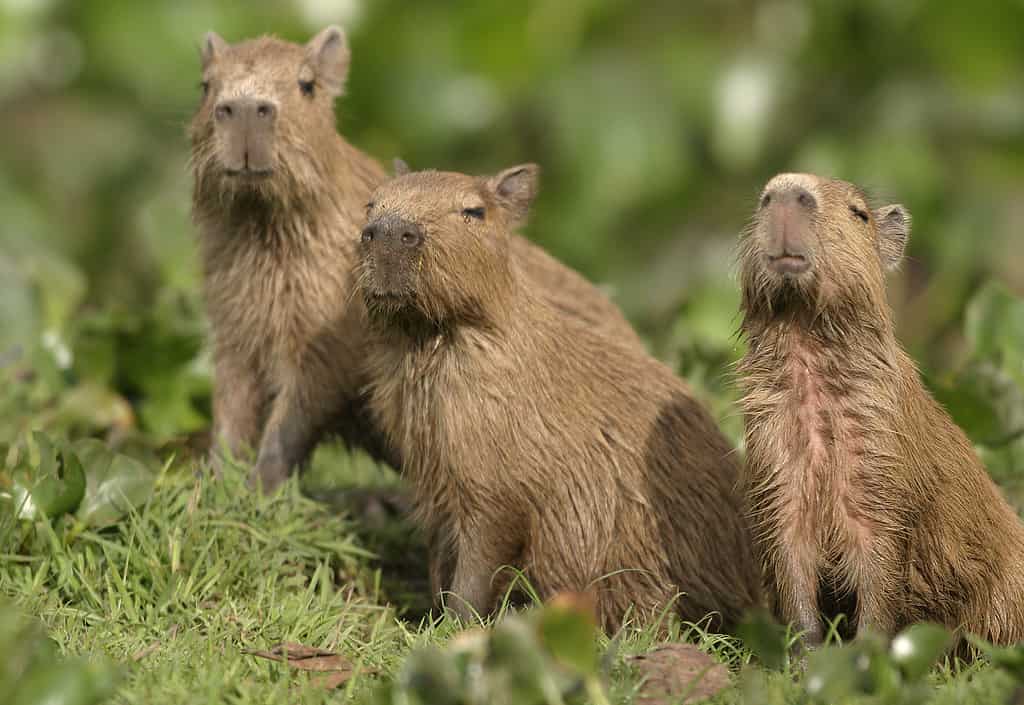
Baby capybaras are very talkative and love to make noise.
©Michel VIARD/iStock via Getty Images
The adorable capybara has captured the hearts of many on social media in the last few years. In fact, in addition to their cute looks, this large rodent has an incredibly sweet personality and relaxed demeanor. As long as capybaras are socialized from an early age and bond well with their owners, they have the potential to display a dog-like temperament. These features combine to make them well-suited to be a house pet, and some have noticed this as well. If you can get your hands on one, Texans are free to keep capybaras as pets in any part of the state.
2. Sloths
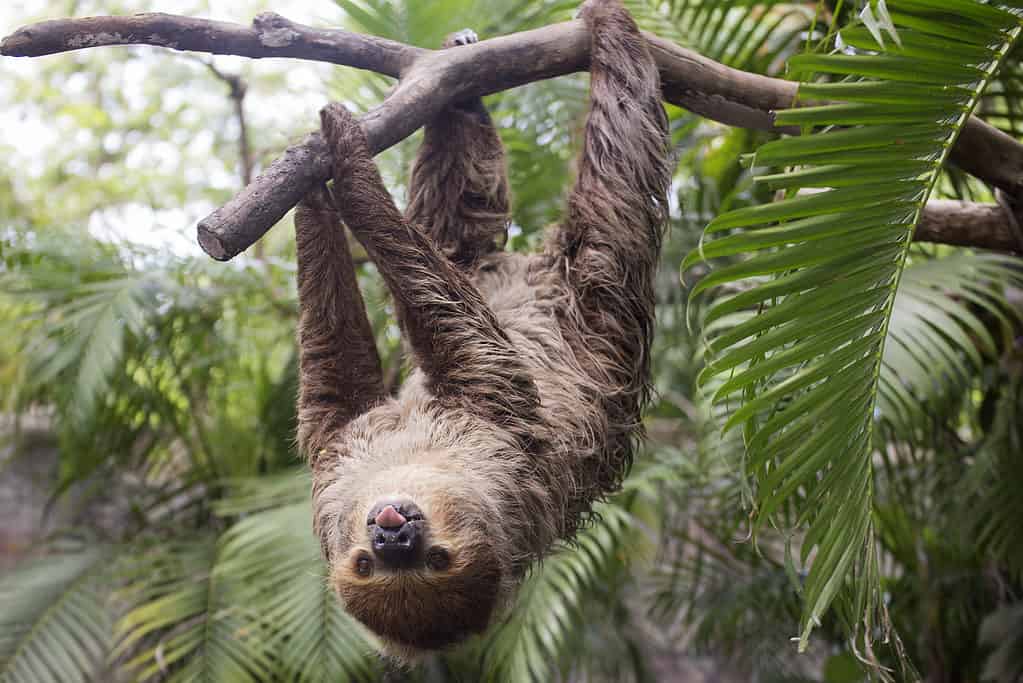
Sloths live for roughly 20 years, but the oldest sloth ever lived to be 50 years old!
©iStock.com/Kung_Mangkorn
If you’re the type of person who’s a bit too much of a couch potato to own a dog, look no further. Sloths are very lazy, relaxed animals who will happily lounge around all day right alongside you. Sloths can sleep for up to 75% of their day, making them as low maintenance as it gets. However, if you do come to own one, be sure to keep their environment in pristine condition. These sleepy creatures are very sensitive to sickness, and even mild carelessness in their cleanliness can lead to serious illness.
3. Chimpanzees

Chimpanzees are omnivores.
©Windzepher/iStock via Getty Images
If your dream pet is a chimpanzee, you’ll need to jump through many hoops before you can welcome one home. Primates are complex animals with unique needs, and Texas law requires that their habitat and diet are up to a certain standard. Beyond their physical needs, it is paramount that their psychological needs are being met as well. In addition, owners may need to register for liability insurance. Only a small portion of counties even allow ownership of “dangerous wild animals,” so it’s important that you check to see if you’re located in one of those areas.
4. Snakes
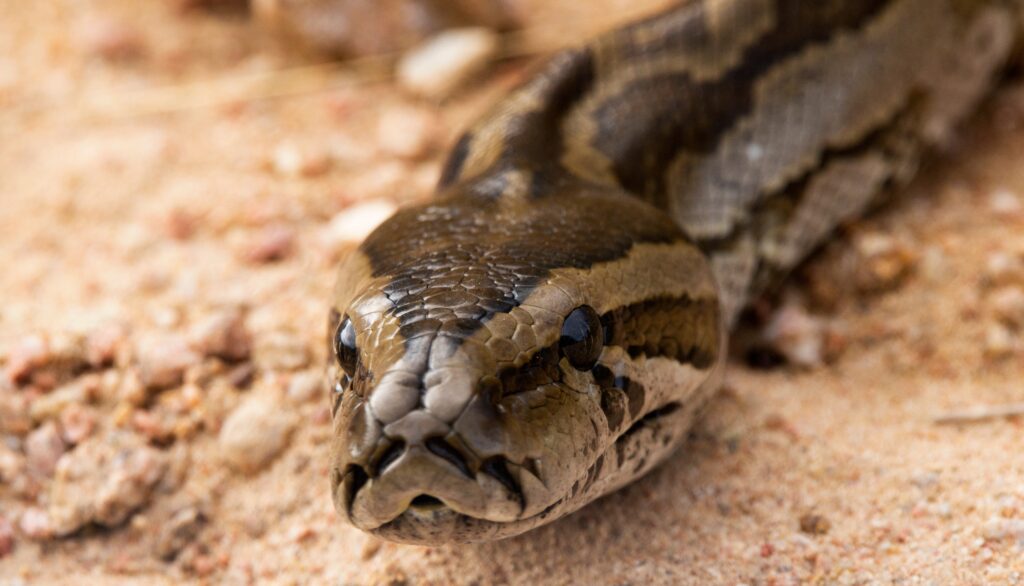
The Southern African rock python can grow to be more than 20 feet long.
©Bruce Crossey/Shutterstock.com
Although most states allow certain snake species to be owned as pets, Texas takes it a few steps further. The law requires additional paperwork for some varieties of poisonous snakes. However, anyone who is willing to obtain a Controlled Exotic Snake Permit will be allowed to own a greater variety. Some of these species include “All non-indigenous (species not native to Texas) venomous snakes and the following constrictors: African rock python (Python sebae), Asiatic rock python (Python molurus), green anaconda (Eunectes murinus), reticulated python (python reticulates), and southern African python (Python natalensis).”
5. Kangaroos
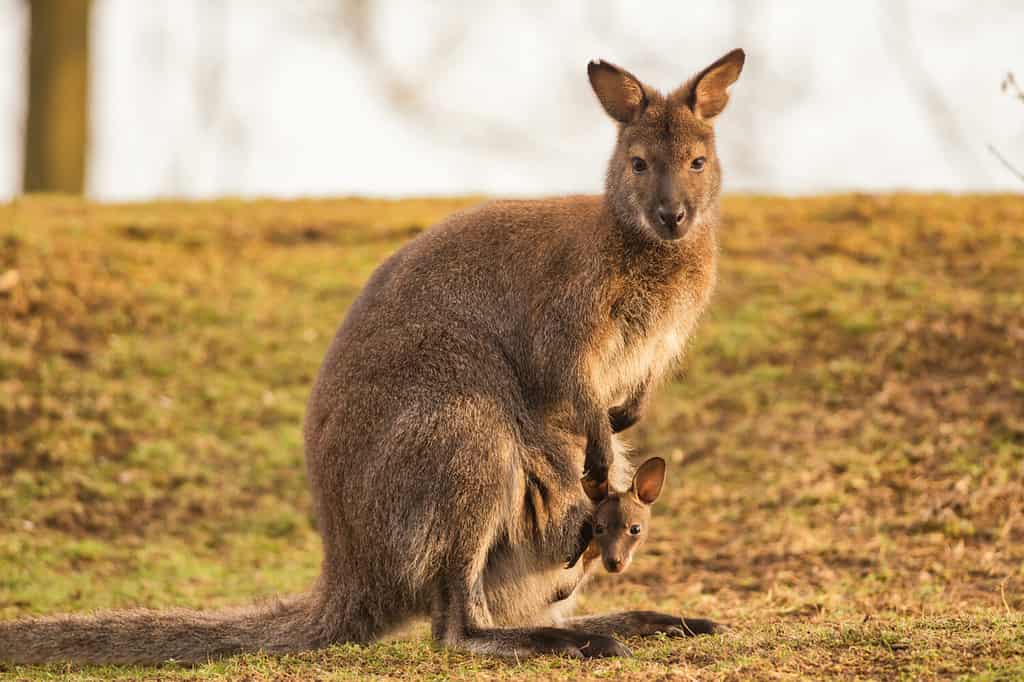
Kangaroos have powerful legs, and they can hop 25 feet into the air.
©Nick Fox/Shutterstock.com
You read that right. Ironically enough, Texans are perfectly fine to own kangaroos as pets. However, this will be no easy task to accomplish. Although it is legal to own a kangaroo, it’s relatively difficult to care for them. These animals have high emotional and physical needs, and falling shy of meeting them can result in your kangaroo’s detriment. They are sensitive animals and are susceptible to stress-related illnesses. In addition to their sensitive personalities, these animals have a lot of physical needs as well. Be sure you have a large amount of property they can explore and be sure to feed them several times a day.
6. Lemurs
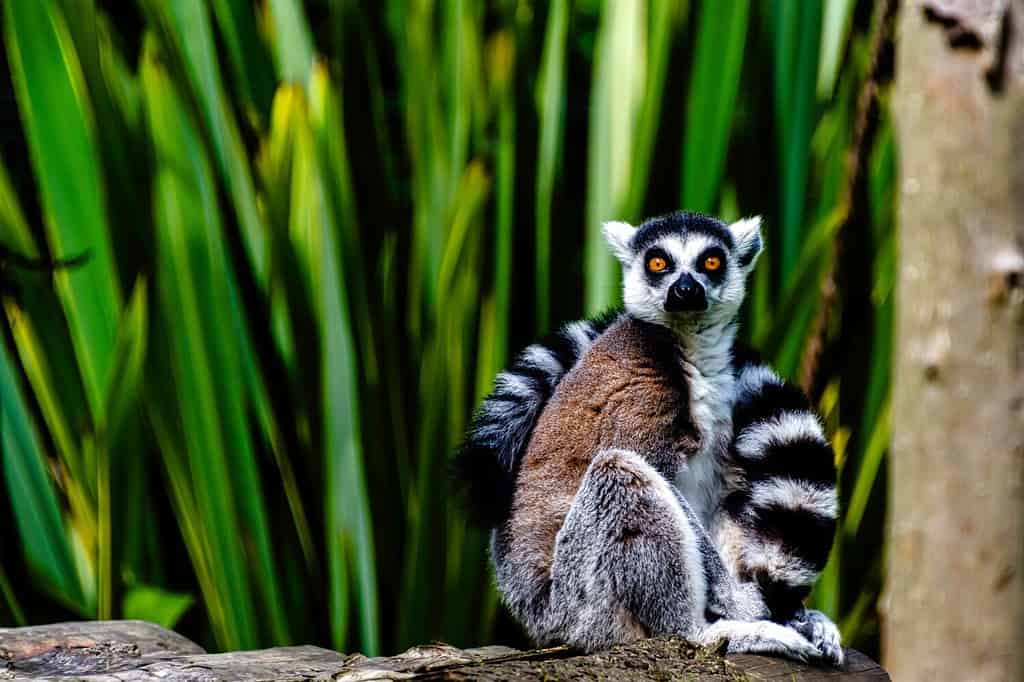
Lemurs are considered the oldest primates in the world.
©Marcin Mierzejewski/Shutterstock.com
All species of lemur are legal in Texas, which gives you a variety of them to choose from. Some of the most common are ring-tailed lemurs, red-ruffled lemurs, and brown lemurs. Lemurs are endangered, which means that they cannot be taken out of the state. It is important that you plan to stay in Texas for a long time before committing to adopting one. On average, lemurs can live for up to 30 years in captivity. That being said, this isn’t a decision to be made on a whim.
7. Squirrels
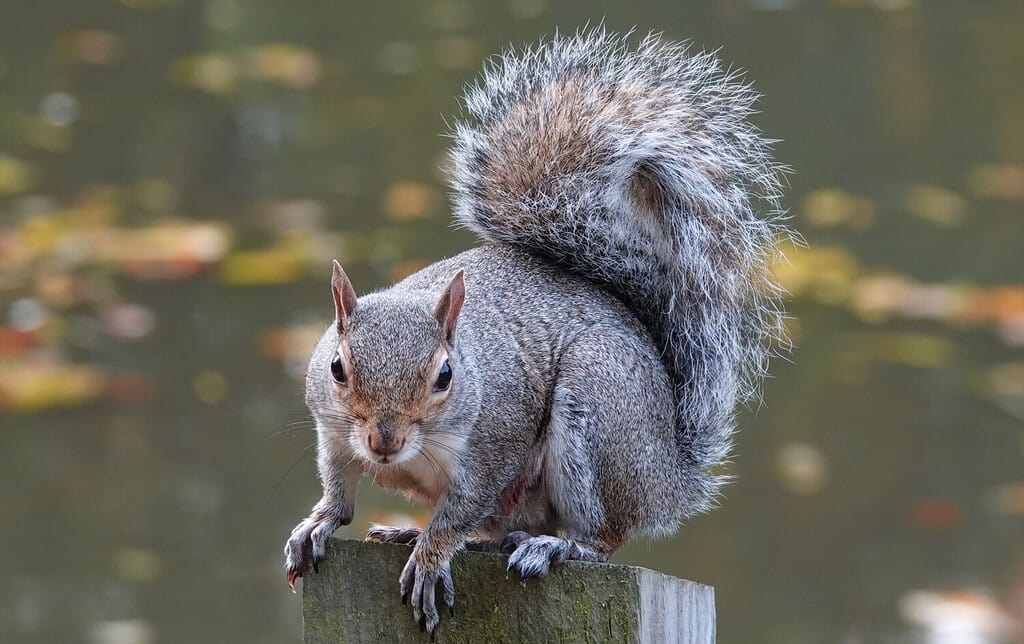
Squirrels’ teeth never stop growing. To keep them a good length, they must chew to wear them down.
©Nigel J. Harris/Shutterstock.com
Have you ever thought of keeping a squirrel as a pet? It’s not as strange as you think, and these adorable creatures are relatively low-maintenance and easy to care for. Similar to other small rodents, squirrels require a sizeable cage, toys, items to chew on, and a healthy diet. Nuts, fruits, and seeds are some of their favorites, so be sure to keep them on hand. Although it is not recommended to take a wild squirrel out of its environment, there is no law preventing citizens from keeping them as pets.
8. Bears
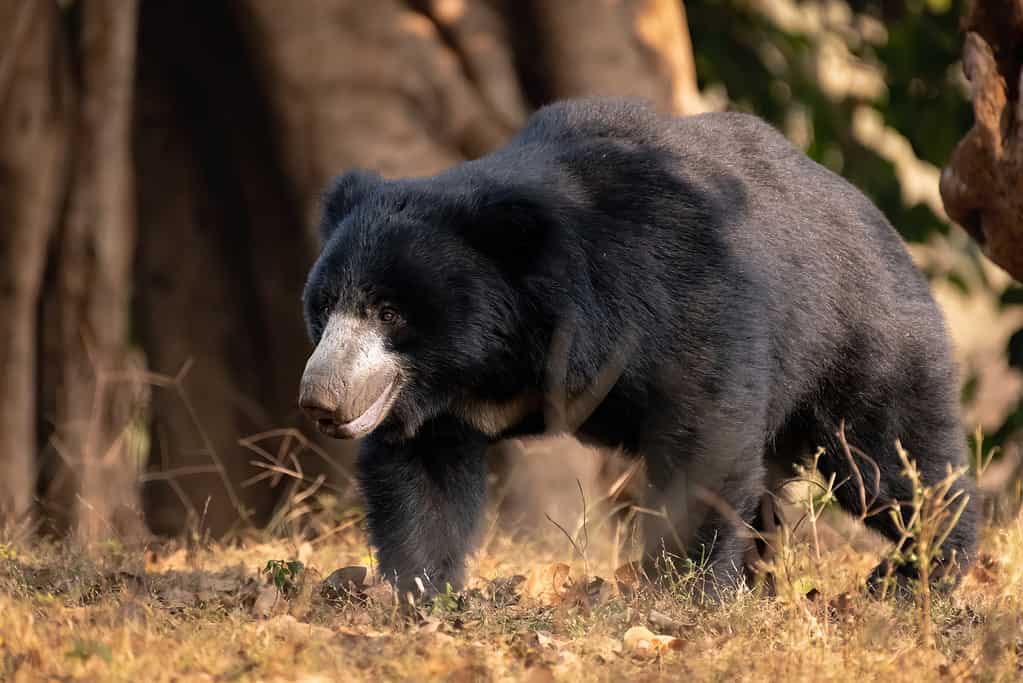
Only eight species of bears exist in the world.
©Malcolm/iStock via Getty Images
Surprisingly, bears are legal to keep as pets under a specific set of circumstances. As with all “wild “dangerous wild animals,” there is much paperwork to be done before a person is able to obtain one legally. Texas law states that individuals will not be permitted to keep one as a pet without a certificate of registration. Texas law also requires that these animals have liability insurance. In addition, owners are obligated to provide them with an adequate enclosure. Owning a bear is a lot of work, both financially and mentally.
9. Hedgehogs
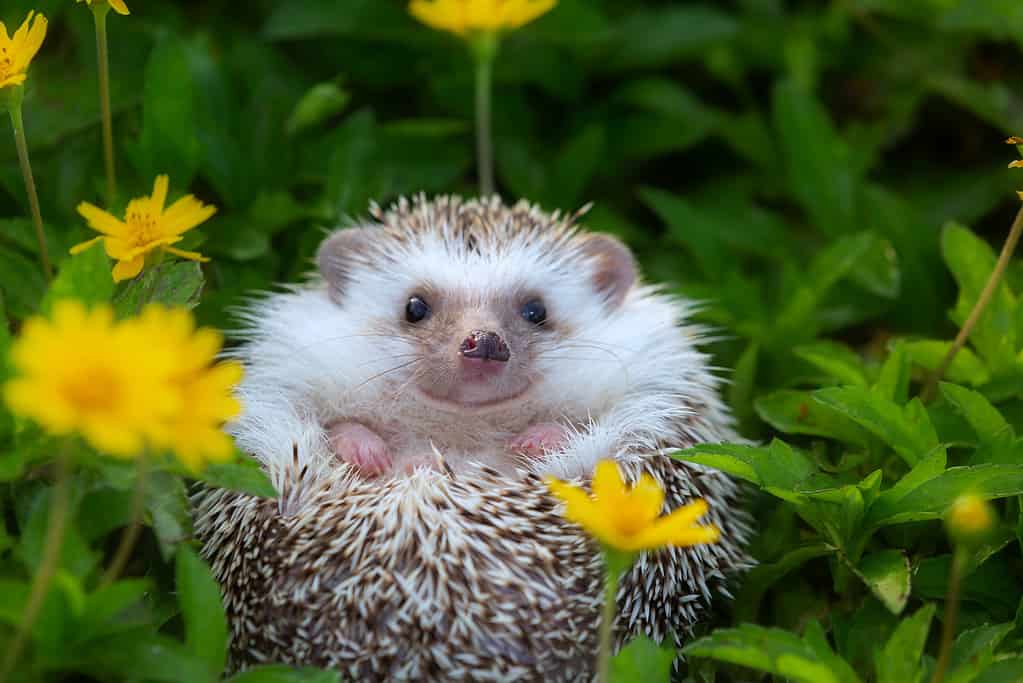
Hedgehogs grow thousands of quills. On average, they’ll have between 5,000 and 7,000 on their body.
©luamduan/iStock via Getty Images
Despite their adorable appearance, hedgehogs are still classified as exotic animals. They may be easier to obtain than some of the other entries on this list. That being said, there is still more work involved in caring for them compared to other small animals. They require special veterinary care and can be costly if health issues arise. However, hedgehogs are laid-back and relaxed animals. They enjoy their solitude and have a nocturnal schedule. If you’re someone who works a regular day job, a hedgehog will make a great pet.
10. Ocelots
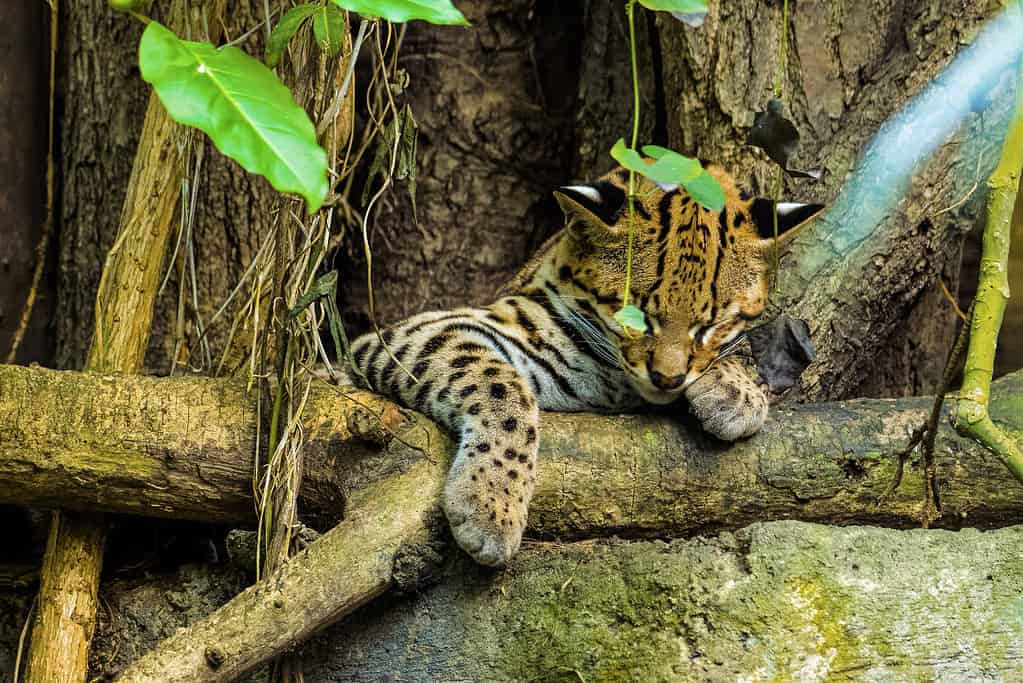
The spots on an ocelot’s fur are completely unique, much like a human fingerprint.
©Thorsten Spoerlein/ via Getty Images
Ocelots are another animal that requires a little extra effort to obtain in the state of Texas. They fall under the category of “dangerous wild animals,” so a permit will be necessary for ownership. In addition, they have special dietary needs and require a large amount of calcium and protein to be at their healthiest. They are athletic and need a lot of room to play and explore. Ocelots are not indoor animals, and they will require secure caging and a suitable habitat. It is highly discouraged for untrained individuals to keep big cats as pets.
11. Tigers
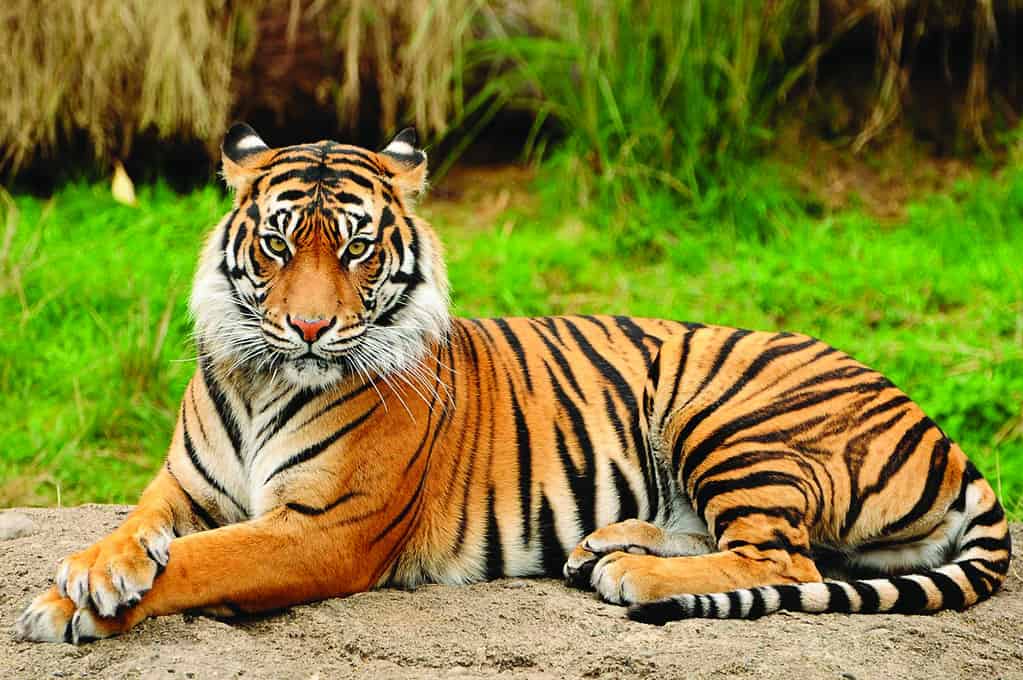
Wild tigers live to be roughly 15 years old.
©Thinker360/iStock / Getty Images Plus via Getty Images
Celebrities and eccentric millionaires have kept big cats as status symbol pets for years. However, everyday citizens can own one as well as long as they’re willing to put in the work. Although it may seem shocking, Texas law allows individuals to keep tigers as pets under certain circumstances. Try not to get too excited, though. Although the recent popularity of Tiger King may have inspired some individuals to research the legality, it doesn’t mean that it will be easy to care for them. It is recommended that only professionals pursue purchasing and keeping a tiger as a pet, as there is a great amount of responsibility that comes along with it. To own a tiger in the state of Texas, you will need to obtain a certificate of registration as they are classified as a “dangerous wild animal.”
How to Care for Exotic Animals
If you’re thinking of adding one of these unique animals to your family, there are a few things to consider before bringing one home. First off, veterinary care will be very different for exotic animals than it will be for pets like dogs or cats. They will need specialized medical care in the event their health becomes threatened, and it’s important to bring them in for routine checkups as well. Be sure to make contact with an appropriate vet before committing to adopting one of these eccentric pets. If you live further than an hour away from a vet who can care for your animals, it might be best to reconsider adopting one.
The diet of these animals will also be highly specialized. Talk to professionals about how to best care for your animal and be sure to budget correctly to provide them with the most nutritious diet possible. Much like their specialized medical care, their diets will be specialized too. (It’s not like you can walk into the grocery store and buy lemur food!) The amount of preparation and paperwork required to obtain any of these exotic animals will vary from species to species, but it’s important to be ready to put a lot of work in. It is also important to consider the personal danger owning these animals can put you in. Only well-trained individuals should seek them, as improper care can result in injury or death.
Final Thoughts
This list covers 11 of the most interesting animals that Texans are legally allowed to keep as pets, but it is not comprehensive. In addition to these entries, you’re able to own alligators, Asian leopard cats, foxes, and bobcats to name a few. Owning an exotic animal is a big commitment financially, mentally, and emotionally. It is important that you’re positive that you’re able to provide them with a high quality of life. Although it’s easy to get swept away in the excitement of owning an exotic animal, adding one of them to your family requires a lot of prep work and specialized care. It is important to think critically about your capability before taking the plunge and purchasing one.
Summary of 11 Baffling Pets That Are Actually Legal to Own in Texas
| Animal | Level of Specialized Care | |
|---|---|---|
| 1 | Capybara | High-maintenance |
| 2 | Sloth | High-maintenance |
| 3 | Chimpanzee | Extremely high-maintenance |
| 4 | Snakes (Exotic) | High-maintenance |
| 5 | Kangaroo | Extremely high-maintenance |
| 6 | Lemurs | High-maintenance |
| 7 | Squirrel | Relatively low-maintenance |
| 8 | Bear | Extremely high-maintenance |
| 9 | Hedgehog | Relatively low-maintenance |
| 10 | Ocelot | Extremely high-maintenance |
| 11 | Tiger | Extremely high-maintenance |
The photo featured at the top of this post is © Thinker360/iStock / Getty Images Plus via Getty Images
Thank you for reading! Have some feedback for us? Contact the AZ Animals editorial team.



